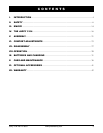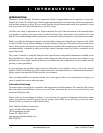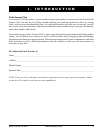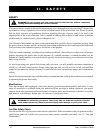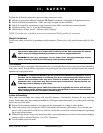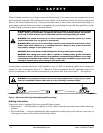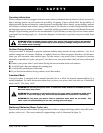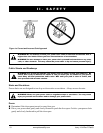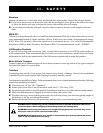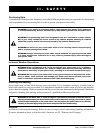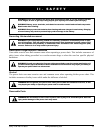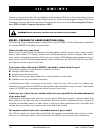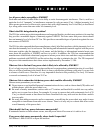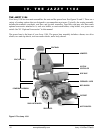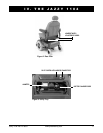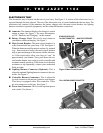
Jazzy 1104 Rev F/Feb03 www.pridemobility.com 11
II. SAFETY
Elevators
Modern elevators have a door edge safety mechanism that, when pushed, reopens the elevator door(s).
n If you are in the doorway of an elevator when the door(s) begin to close, push on the rubber door edge
or allow the rubber door edge to contact the power chair and the door will reopen.
n Use care that pocketbooks, packages, or power chair accessories do not become caught in elevator
doors.
EMI & RFI
Laboratory tests performed by the Food and Drug Administration (FDA) have shown that radio waves can
cause unintended motion of electric mobility vehicles. Radio waves are a form of electromagnetic energy
(EM). When EM adversely affects the operation of an electronic device, it is called Electromagnetic
Interference (EMI) or Radio Frequency Interference (RFI). For more information, see III. EMI/RFI.
Lift/Elevation Products
If you will be traveling with your power chair, you may find it necessary to use a lift/elevation product to
aid in transportation. Pride recommends that you closely review the instructions, specifications, and safety
information set forth by the manufacturer of the lift/elevation product before using that product.
Motor Vehicle Transport
Currently, there are no standards approved for tie-down systems in a moving vehicle of any type to transport
a person while seated in a power chair.
Transfers
Transferring onto and off of your power chair requires a good sense of balance. Always have an attendant
or healthcare professional present while learning to properly transfer yourself.
To eliminate the possibility of injury, Pride recommends that you or a trained attendant perform the following
tasks before attempting a transfer:
n Turn the power off. See VIII. Operation.
n Ensure your power chair is not in freewheel mode. See IV. The Jazzy 1104.
n Turn both caster wheels toward the transfer destination to improve power chair stability during transfer.
n Make sure both armrests are flipped up or removed from your power chair.
n Flip the footrest up, or move the leg rests aside; this will help to keep your feet from getting caught on
the footrest or the leg rests during the transfer.
n Reduce the distance between your power chair and the object you are transferring onto.
WARNING! Before transferring, position yourself as far back as possible in the power chair seat to
prevent the power chair from tipping forward during transfer and causing injury.
WARNING! Avoid using your armrests for weight bearing purposes. Such use may cause
the power chair to tip and cause personal injury.
WARNING! Avoid putting all of your weight on the footrest. Such use may cause the power
chair to tip and cause personal injury.



